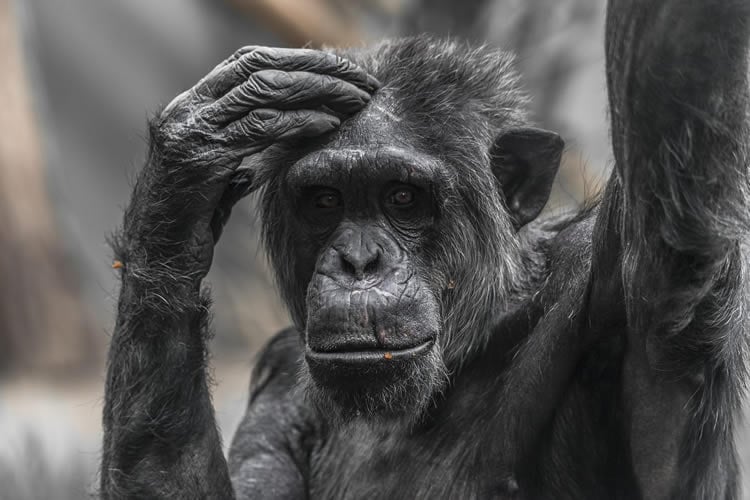Summary: Researchers report personality traits in chimpanzees are correlated to the size of their hippocampus. The study reports greater hippocampal volume is linked to an increase in alpha behavior and decreased self regulatory function.
Source: Georgia State University.
Chimpanzee personality traits are correlated with the size of the brain’s hippocampus, according to research led by Georgia State University. The study has implications for understanding the foundation of human personality structure, which is known to be similar to that of chimpanzees and also known to underlie mental illness.
“While individuals who meet diagnostic criteria for the same psychiatric disorders do not always experience the same symptoms, they do generally tend to share the same basic personality traits,” said lead author Robert D. Latzman, associate professor in the Department of Psychology.
Just as in humans, chimpanzee personality traits appear to form in response to genetic and neural factors. However, socio-cultural factors also play a role in the formation of personality traits and behaviors in humans. Given the striking similarity between humans and chimpanzees—and because these socio-cultural factors can be well-controlled for—the researchers say chimpanzees are uniquely well-suited for analyzing the neurobiological contributors to personality.
Latzman and his colleagues studied brain imaging data and personality ratings for 191 chimpanzees. They examined how individual variations in personality correlated with volume in two regions of the brain’s limbic system widely believed to be associated with emotion: the amygdala and the hippocampus.
“Surprisingly we did not find an association between specific personality traits and the size of the amygdala, even though it has long been considered the emotional center of the brain,” said Latzman. “One potential explanation is that the function of the amygdala may matter more than its structure with regards to personality.”
They found a correlation between increased hippocampal volume and an increase in “alpha” behavior (a tendency to behave in an under-controlled and agonistic way) as well as a decrease in self-regulatory functioning.

“The chimpanzees with greater hippocampal gray matter were more impulsive and more disinhibited,” said Latzman. “This underscores the importance of the hippocampus not only in regulating emotion, but also in the neurobiological foundation of broader dispositional dimensions (such as an alpha disposition) and fine-grained personality traits (such as impulsivity).”
These “alpha” dispositional traits have correlations in humans, where they have been linked to mental health disorders, according to Latzman.
“Our ability to understand the evolutionary basis of these traits may say something about the evolutionary and biological roots of both personality and psychopathology,” he said. “This kind of research could help scientists develop interventions that target the underlying dispositions associated with mental illness.”
Source: Jennifer Rainey Marquez – Georgia State University
Publisher: Organized by NeuroscienceNews.com.
Image Source: NeuroscienceNews.com image is credited to the researchers.
Original Research: Abstract for “Neuroanatomical Correlates of Hierarchical Personality Traits in Chimpanzees: Associations with Limbic Structures” by Robert D. Latzman, Sarah T. Boysen and Steven J. Schapiro in Personality Neuroscience. Published July 4 2018.
doi:10.1017/pen.2018.1
[cbtabs][cbtab title=”MLA”]Georgia State University”Chimpanzee Personality Traits Linked to Their Brain Structure.” NeuroscienceNews. NeuroscienceNews, 6 July 2018.
<https://neurosciencenews.com/chimp-personality-brain-structure-9524/>.[/cbtab][cbtab title=”APA”]Georgia State University(2018, July 6). Chimpanzee Personality Traits Linked to Their Brain Structure. NeuroscienceNews. Retrieved July 6, 2018 from https://neurosciencenews.com/chimp-personality-brain-structure-9524/[/cbtab][cbtab title=”Chicago”]Georgia State University”Chimpanzee Personality Traits Linked to Their Brain Structure.” https://neurosciencenews.com/chimp-personality-brain-structure-9524/ (accessed July 6, 2018).[/cbtab][/cbtabs]
Abstract
Neuroanatomical Correlates of Hierarchical Personality Traits in Chimpanzees: Associations with Limbic Structures
A converging literature has revealed the existence of a set of largely consistent, hierarchically organized personality traits, that is broader traits are able to be differentiated into more fine-grained traits, in both humans and chimpanzees. Despite recent work suggesting a neural basis to personality in chimpanzees, little is known with regard to the involvement of limbic structures (i.e., amygdala and hippocampus), which are thought to play important roles in emotion. Using saved maximum likelihood estimated exploratory factor scores (two to five factors) in the context of a series of path analyses, the current study examined associations among personality dimensions across various levels of the personality hierarchy and individual variability of amygdala and hippocampal grey matter (GM) volume in a sample of captive chimpanzees (N=191). Whereas results revealed no association between personality dimensions and amygdala volume, a more nuanced series of associations emerged between hippocampal GM volume and personality dimensions at various levels of the hierarchy. Hippocampal GM volume associated most notably with Alpha (a dimension reflecting a tendency to behave in an undercontrolled and agonistic way) at the most basic two-factor level of the hierarchy; associated positively with Disinhibition at the next level of the hierarchy (“Big Three”); and finally, associated positively with Impulsivity at the most fine-grained level (“five-factor model”) of the hierarchy. Findings underscore the importance of the hippocampus in the neurobiological foundation of personality, with support for its regulatory role of emotion. Further, results suggest the importance of the distinction between structure and function, particularly with regard to the amygdala.






